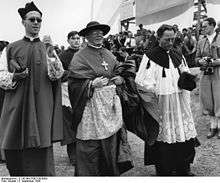Bernard Griffin
| His Eminence Bernard Griffin | |
|---|---|
| Cardinal, Archbishop of Westminster | |
 Cardinal Griffin in Fulda, Germany, 1954 | |
| Archdiocese | Westminster |
| Appointed | 18 December 1943 |
| Term ended | 19 August 1956 |
| Predecessor | Arthur Hinsley |
| Successor | William Godfrey |
| Other posts | Cardinal Priest of Santi Andrea e Gregorio al Monte Celio |
| Orders | |
| Ordination | 1 November 1924 |
| Consecration |
30 June 1939 by Thomas Leighton Williams |
| Created Cardinal | 18 February 1946 |
| Rank | Cardinal Priest |
| Personal details | |
| Birth name | Bernard William Griffin |
| Born |
21 February 1899 Birmingham, Warwickshire, England, United Kingdom of Great Britain and Ireland |
| Died |
19 August 1956 (aged 57) New Polzeath, Cornwall, United Kingdom |
| Buried | Westminster Cathedral, London, England, United Kingdom |
| Nationality | British |
| Denomination | Roman Catholic |
| Parents | William Griffin & Helen Swadkins |
| Previous post |
|
| Alma mater | English College, Rome |
| Styles of Bernard Griffin | |
|---|---|
 | |
| Reference style | His Eminence |
| Spoken style | Your Eminence |
| Informal style | Cardinal |
Bernard William Griffin (1899–1956) was an English Cardinal of the Roman Catholic Church.[1] He served as Archbishop of Westminster from 1943 until his death, and was elevated to the cardinalate in 1946 by Pope Pius XII.
Biography
Bernard and his twin brother Basil were born in Birmingham to William and Helen (née Swadkins) Griffin. His father was a Bicycle Manufacturer, Birmingham City councillor and justice of the peace.[2]
They were a devoted family and were under the watchful eye of their parish priest. One day, both twins went to confession. When they came out the brothers found that Father O’Hagan had asked them both the same question; ‘What are you going to be?’. They had both answered, ‘I want to be a priest’. Both boys were clever and won scholarships to the local grammar school but Bernard’s desire to be a priest led him to transfer to Cotton College in Staffordshire.
When the First World War broke out in 1914 both Bernard and Basil joined the Royal Naval Air Service, with whom Bernard served as an air-raid warden.[2] During this time he suffered a heart attack but concealed it from physicians in order to avoid a discharge which he feared would prevent his acceptance for the priesthood.[3]
After the war Bernard went to Oscott College in Birmingham to train to be a priest. Ordained to the priesthood on 1 November 1924, he finished his studies at the Venerable English College in Rome in 1927. Griffin then worked as private secretary to John McIntyre, the Archbishop of Birmingham, until 1937. From 1929 to 1938, he served as diocesan chancellor of Birmingham, director of studies of the Catholic Evidence Guild, Catholic representative on the BBC's religious advisory committee, and administrator of diocesan charitable homes.
On 26 May 1938, Griffin was appointed Auxiliary Bishop of Birmingham and Titular Bishop of Appia. He received his episcopal consecration on the following 30 June from Thomas Williams (Archbishop of Birmingham), with John Barrett, Bishop of Plymouth, and William Lee (Bishop of Clifton), serving as co-consecrators, in the Cathedral of Saint Chad, Birmingham. Pius XII raised Griffin to Archbishop of Westminster, and thus ranking prelate in the Catholic Church in England and Wales, on 18 December 1943. At his installation mass in Westminster Cathedral, he defended the sanctity of marriage.[4]
Griffin was created Cardinal-Priest of Ss. Andrea e Gregorio al Monte Celio by Pius XII in the consistory of 18 February 1946. At age 46, he was the youngest cardinal to be appointed at the ceremony, to which he wore the tailored cappa magna of his deceased predecessor cardinal, Arthur Hinsley.[5] He acted as papal legate to the centennial celebration of the restoration of the Catholic hierarchy in England in 1950.
As Cardinal, Griffin took a keen interest in the rebuilding of post-war Britain arguing especially for the provision of Catholic schools. He was seen by some as liberal in areas of social principles. He also supported Sir William Beveridge.[2]
Griffin upheld the doctrine of the perpetual virginity of Mary,[6] and was once a president on The Council of Christians and Jews.[7]
Griffin died from a heart attack in New Polzeath, at age 57,[8] and was buried at Westminster Cathedral.
His coat of arms is blazoned 'Gules issuant from a barrulet enarched in base a sweet william plant in pale Or supported by a Saint Bernard dog dexter and a griffin wings addorsed sinister Or', thus representing his full name.
On the 22 October 1960, Bernard's twin brother, Basil, laid the foundation stone of Cardinal Griffin Catholic High School in Cannock, Staffordshire.
References
- ↑ Miranda, Salvador. "Bernard William Griffin". The Cardinals of the Holy Roman Church. Retrieved 2015-03-07.
- 1 2 3 Time Magazine. Surprise 3 January 1944
- ↑ Time Magazine. New Archbishop 18 February 1957
- ↑ Time Magazine. Pretty Pass 18 February 1946
- ↑ Time Magazine. On the Roads to Rome 31 January 1944
- ↑ TIME Magazine. Jesus & His Brethren 23 May 1955
- ↑ Time Magazine. The Catholics Leave 10 January 1955
- ↑ Time Magazine. Milestones 3 September 1956
External links
| Catholic Church titles | ||
|---|---|---|
| Preceded by Arthur Hinsley |
Archbishop of Westminster 1943–1956 |
Succeeded by William Godfrey |
| Preceded by Jusztinián György Serédi |
Cardinal priest of SS. Andrea e Gregorio al Monte Celio 1946–1956 |
Succeeded by John Francis O'Hara |